When we talk about building businesses, we often talk about how data is a compass, guiding organizations toward more informed and strategic decision-making, which is obviously important for growth. CRM data is a huge part of the current and ongoing data revolution, providing a whole host of insights that businesses can leverage to refine their strategies, enhance customer experiences, and ultimately drive that much-needed growth.
Businesses like yours can unlock all sorts of opportunities by understanding and utilizing the data generated through CRM systems, leading to more effective decision-making. Let’s move on and talk about a few of the ways you can use said data.

First off, CRMs are a huge part of transforming sales strategies, bringing data-driven precision to a process that was once more guesswork than anything else. These platforms offer a centralized repository of information where every interaction with a customer or potential lead is recorded and sorted for you to find easily.
By analyzing this data, your sales team can identify patterns, understand customer preferences, and predict future behaviors based on previous actions and responses. For instance, insights gained from CRM data can let the team know which products or product features are working for your customers, allowing sales teams to tailor future pitches accordingly.
Sales forecasting in and of itself also becomes more accurate when grounded in the historical data and trends embedded within CRM analytics. This lets businesses allocate resources more efficiently and set realistic sales targets.

Beyond boosting sales, CRMs also play a key role in improving customer retention. Retaining existing customers is, generally, far more cost-effective than acquiring new ones, so customer retention strategies are a big part of any business’s success.
CRM data provides a detailed view of customer interactions, purchase history, and preferences, enabling businesses to personalize engagement and strengthen sales and retention relationships. By segmenting customers based on their behavior and preferences, a business can develop far more targeted communication strategies that actually resonate with their clients on a far more personal level. This targeted approach fosters loyalty and encourages repeat business, creating a mutually beneficial relationship between customer and company.
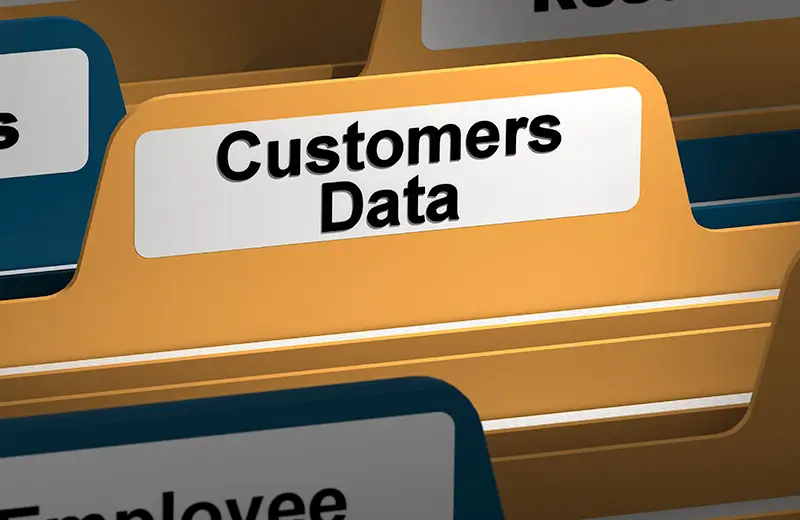
Another benefit is how integrating CRM data into the decision-making process can elevate a company’s competitive edge. Businesses that effectively harness their CRM data are better positioned to understand real-time market trends, anticipate customer needs, and more quickly adapt to changes.
By having access to real-time data, decision-makers can quickly assess the impact of their strategies and make timely adjustments, rather than waiting weeks or even months to see results. This agility is invaluable when we are talking about a market where consumer expectations and competitive dynamics are constantly shifting and changing.

Now, while the benefits of leveraging CRM data is pretty clear, many businesses might face challenges when it comes to effectively utilizing said information. Data silos, inadequate data quality and storage, irrelevant data, and lack of proper training or tools can hinder the full potential of any system and any team.
To maximize the value of CRM data, you should prioritize data cleanliness and invest in platforms that facilitate seamless data integration and analysis. Furthermore, equipping your team members with all the necessary skills to interpret and act on data insights is equally important to foster a data-driven culture within the organization.

Ultimately, CRMs serve as a fundamental tool for any business that wants to boost its decision-making processes. By tapping into the rich datasets offered by these systems, companies can refine sales strategies, bolster customer retention, and make even more informed decisions.
However, the key to this success lies in overcoming data-related challenges and encouraging a culture that values said data-driven insights. So, to stay ahead of the curve and make informed decisions, you need to make data your friend, and you can only do that by utilizing your CRM to its fullest and getting your entire team to do the same.
For extra insights on how to make the most of your CRM, check out these blogs:
Ready to make smarter, data-driven decisions? Book a free consultation today to learn how CRM data can transform your business strategies and help you achieve your goals!
If you have ever tried navigating the world of Customer Relationship Management systems, or CRMs, then it might have occasionally felt like sailing through some particularly stormy seas. One moment you are doing fine and the next you are thrown completely off course by the always-changing tides of tech and user demands. Luckily it doesn’t have to stay that way! Today we are highlighting five common CRM mistakes and how you can transform them from pitfalls to valuable insights.

Now, it is tempting to think that your shiny new CRM system is a plug-and-play; you just put in your info and start using it right away. Unfortunately, one of the most common mistakes we see people make is skipping training for your team early on. Any CRM is only as effective as the people using it and if your staff does not know how to navigate its features, especially the ones critical to your business, that system essentially becomes a costly digital paperweight.
Luckily for you the fix for this particular mistake is fairly easy. Invest in a comprehensive training program for all employees who will interact with the CRM software so that everyone knows what they are supposed to be doing. Most CRMs have training sessions specifically to train teams just like yours or you might engage a CRM consulting firm such as ours to get everyone up to speed. And, remember, continuous learning should be trusted and drilled into the company culture, encouraging users to enhance their skills and productivity.

Next up, customizing a CRM can make it feel tailor-made for your business, keeping the most useful aspects and dropping ones you don’t need, but beware the trap of over-tweaking! Too much customization can lead to maintenance nightmares and confusion among users, especially those who have been trained to expect things a certain way.
To solve this problem it is best to adopt a 'less is more' philosophy when it comes to customizing your CRM. Focus on essential modifications that directly enhance business goals. Make decisions by consulting the team that will use or maintain the system, and ensure customizations support business processes rather than slow them down.

Moving on, a CRM system is only a tool and not a genie to make all your problems disappear with the press of a button. And, most importantly, it cannot do anything on its own. Without clear goals and objectives, i.e a proper plan for what you want your CRM to do and how it will benefit your business, you'll find yourself tangled in a mess of features and data with no defined endpoint in sight.
Instead, start off on the right foot by clearly defining the goals you want to achieve. Are you looking to improve customer engagement, streamline sales processes, or better analyze data? With targeted objectives, you can better assess CRM features and align them with specific business needs. Keep in mind that you will need to regularly revisit and refine these goals as your business evolves.

This is a two-fold problem… A CRM system without data being fed into it continuously is a ship without a compass, but one with too much extraneous info is effectively a digital junk drawer. You want to find the right balance between too little and too much data, and poor data management leads to inaccurate client profiles and misguided decisions.
To fix this, implement data quality measures by regularly auditing and cleansing your database. Also, make sure that there are consistent data entry protocols and implement automated processes where possible to avoid human error. Your best bet here is to assign a CRM leader - a dedicated staff member responsible for database accuracy and integrity.

Finally, any CRM system should empower its users at every level, from the very bottom to the tip-top, and not become some stagnant thing that never updates with the change of time and users. Ignoring the valuable feedback of those who interact with the system daily can cause all sorts of problems, from disengagement to inefficiency and more.
Instead, aim to cultivate a consistent feedback loop with CRM users. This can be done by creating forums or channels specifically for CRM discussions. Also, allow and even encourage staff to propose improvements.Continuous feedback, followed by actionable reforms, can unlock the potential of even the most reticent CRM user.

In the end, identifying these common CRM mistakes and applying out strategic solutions instead will allow business leaders to harness the power of their systems far more efficiently and effectively. Let's turn those potential pitfalls into great opportunities for you and your team so that you can get back to the business of doing business.
At Woggle Consulting, we love Zoho CRM for its flexibility and user-friendly features. For more insights on optimizing your CRM experience, check out our blog on how to migrate to Zoho CRM.
Having a customer relationship management (CRM) system that adapts to your unique needs is a game-changer.
Enter Zoho Canvas, a revolutionary feature within the Zoho CRM ecosystem that empowers users to design and customize their CRM interface to reflect their business's specific workflows and aesthetic preferences. This blog post will delve into what Zoho Canvas is, its benefits, and how it can transform your CRM experience.
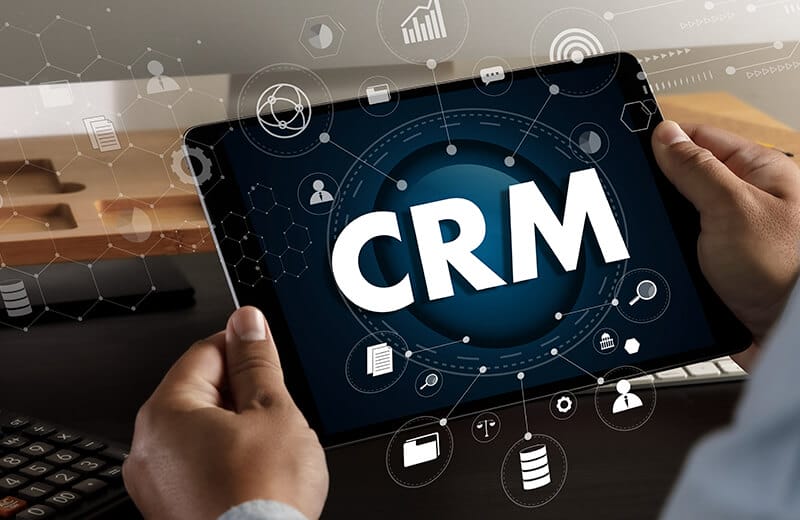
Zoho Canvas is a drag-and-drop interface design tool that allows users to create custom views for their CRM data. Unlike traditional CRM interfaces that can feel rigid and one-size-fits-all, Zoho Canvas offers a high degree of flexibility, enabling businesses to tailor the look and feel of their CRM to better align with their processes and branding.
With Zoho Canvas, you are not just limited to the standard layouts provided by your CRM. You can design a user interface (UI) that suits your specific needs, whether that means creating a minimalist view for quick data entry or a detailed layout that provides comprehensive customer insights at a glance.
Drag-and-Drop Interface: The intuitive drag-and-drop functionality of Zoho Canvas makes it accessible to users of all technical backgrounds. You don’t need to know how to code to create a beautiful and functional interface.
Custom Views: Create custom views that cater to different departments within your organization. For instance, your sales team might need a detailed view of client interactions, while your support team might benefit from a streamlined ticket management layout.
Rich Text Formatting: Enhance your data presentation with rich text formatting options. This feature allows you to use various fonts, colors, and styles to highlight important information and improve readability.
Custom Components: Add custom components such as images, buttons, and widgets to your CRM interface. These elements can help you create a more engaging and user-friendly experience.
Conditional Formatting: Use conditional formatting to automatically change the appearance of data fields based on specific criteria. This can help you quickly identify important information, such as overdue tasks or high-value leads.
Reusable Templates: Save time by creating reusable templates for common layouts. These templates can be applied across different modules, ensuring a consistent look and feel throughout your CRM.
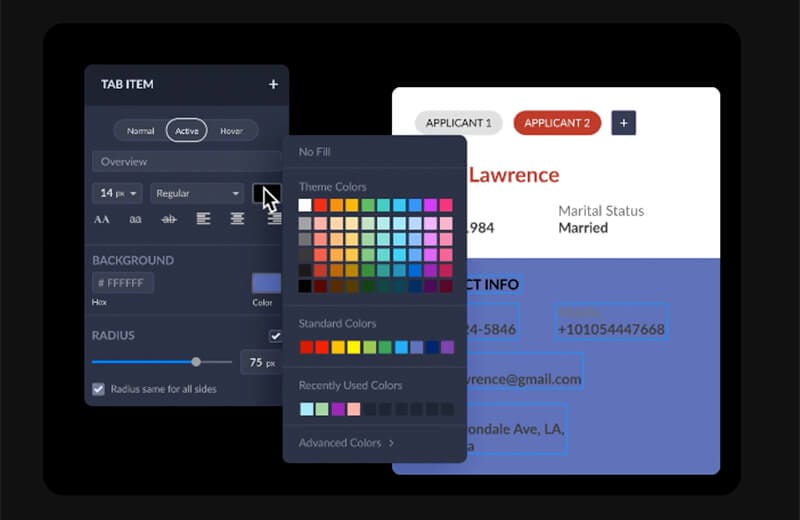
Enhanced Usability: By customizing your CRM interface, you can create a more intuitive and user-friendly experience. This can lead to increased adoption rates among your team and improved overall efficiency.
Improved Data Visualization: Zoho Canvas allows you to present your data in a way that makes sense for your business. Custom views and conditional formatting help ensure that important information is easily accessible and visually appealing.
Tailored Workflow: Different teams within your organization have different needs. Zoho Canvas enables you to create interfaces that align with each team’s specific workflows, improving productivity and reducing friction.
Brand Consistency: A customized CRM interface can help reinforce your brand identity. By incorporating your company’s colors, logos, and design elements, you can create a cohesive experience that aligns with your overall branding strategy.
Scalability: As your business grows and evolves, so too can your CRM interface. Zoho Canvas makes it easy to adjust and expand your layouts to accommodate new processes, teams, and data sources.
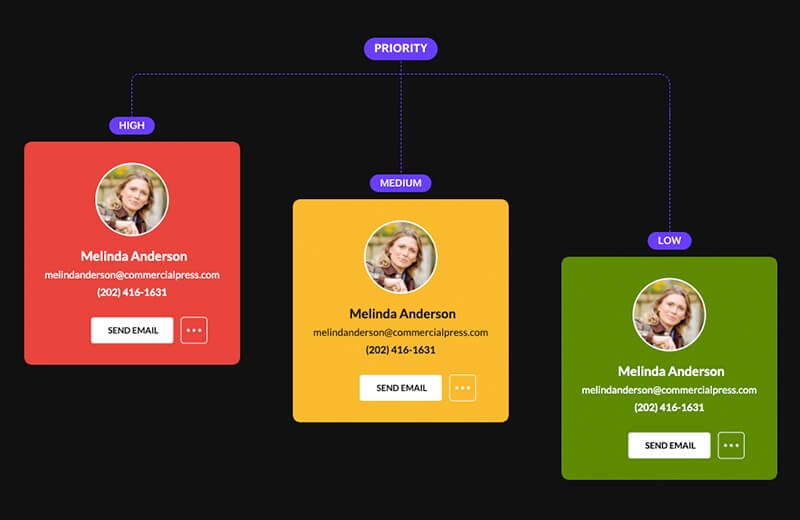
1. Accessing Zoho Canvas: To begin using Zoho Canvas, log in to your Zoho CRM account. Navigate to the module you want to customize and select the “Canvas” option from the view settings.
2. Designing Your Layout: Use the drag-and-drop editor to design your custom layout. Add fields, components, and formatting as needed to create a view that suits your business requirements.
3. Preview and Publish: Once you’re satisfied with your design, preview it to ensure everything looks and functions as expected. Make any necessary adjustments, then publish your layout for your team to use.
4. Training and Adoption: Introduce your team to the new interface and provide training to help them get the most out of the customized views. Encourage feedback and be prepared to make further tweaks based on their input.
5. Ongoing Optimization: Regularly review and update your CRM layouts to ensure they continue to meet your business needs. Zoho Canvas makes it easy to iterate and improve your designs over time.
Imagine a sales team that needs quick access to lead information while on the go. With Zoho Canvas, you can create a mobile-friendly view that prioritizes key data fields and includes action buttons for common tasks like calling or emailing leads. Alternatively, a customer support team might benefit from a detailed ticket view that includes customer history, priority levels, and resolution times, all designed to streamline the support process.
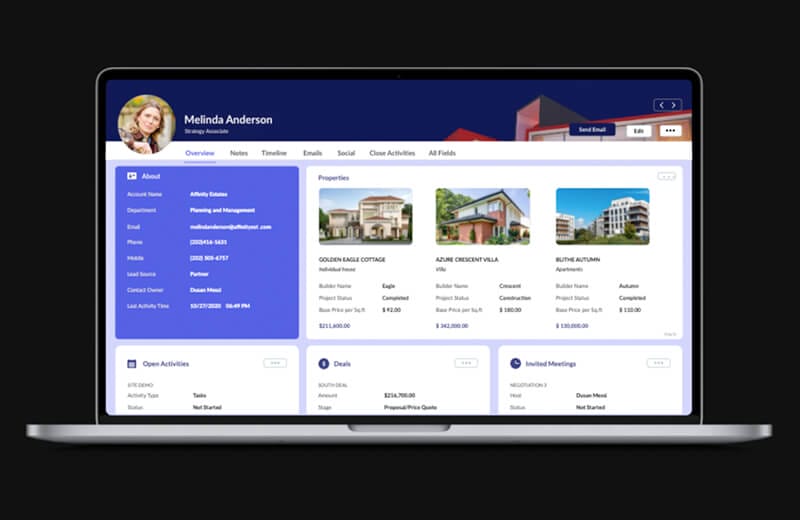
Zoho Canvas is a powerful tool that transforms how businesses interact with their CRM data. By offering customization options, it enables organizations to create interfaces that enhance usability, improve data visualization, and align with unique workflows. Whether you’re looking to increase team efficiency, maintain brand consistency, or scale your operations, Zoho Canvas provides the flexibility and functionality you need to take your CRM to the next level.
Do you need a hand with implementation? Chat with our team about the best solutions for your business.
Marketing trends are constantly evolving.
Change is the one “trend” you can count on in digital marketing. As technology continues to evolve at lightning speed, so do the preferences and behaviors of consumers.
Enter Gen Z, the digital natives born between the mid-1990s and early 2010s, who are reshaping the landscape of digital marketing and tech in general. In this blog post, we'll explore why SaaS companies need to start marketing to Gen Z and how they can do it most effectively. We reached out for a little help from our friends over at Lucent Creative Co., a woman-owned marketing agency.
Well, let's start with the basics.
Gen Z is the first generation to grow up entirely in the digital age.
They've never known a world without smartphones, social media, or on-demand streaming services.
Fun Fact: Remember the whole thing where you mailed DVDs back and forth to Netflix? Yeah, you just blew the mind of a Gen Z.
One of the key reasons SaaS companies should start marketing to Gen Z is their sheer purchasing power. Gen Z represents a lucrative market opportunity that cannot be ignored. But it's not just about their wallets; it's also about their influence.
Cue the term influencer.
Gen Z wields significant influence over household spending decisions, often playing a pivotal role in shaping the purchasing behaviors of their parents and peers. They are trendsetters, early adopters, and champions of brands that align with their values and resonate with their digital-centric lifestyles. For SaaS companies looking to gain a competitive edge, winning over Gen Z could be the key to long-term success.

Let's delve into some key insights with Kendall Walker, CEO of Lucent Creative Co.
We asked Kendall for her insight on what makes Gen Z tick, and she shared the five attributes SaaS companies should present to make a splash in the Gen Z marketing pool.
Gen Z craves authenticity above all else.
“The Gen Z demographic has little patience for brands that try to be something they're not. Honesty and authenticity are the keys to engaging Gen Z.”, Kendall shares.
SaaS companies must prioritize transparency, honesty, and genuine connection in their marketing efforts. Whether it's through user-generated content, influencer partnerships, or behind-the-scenes glimpses into company culture, authenticity should permeate every aspect of the brand's messaging.
Pro Tip: Give your email campaign a makeover for further reach. Learn more.

For Gen Z, the smartphone is their lifeline to the world—communicating, researching, shopping, and even social activism. They spend an average of over four hours per day on their mobile devices, consuming content, communicating with friends, and making purchasing decisions on the go.
“SaaS companies need to optimize their websites, apps, and marketing materials for mobile-friendly use. Failing to do that is a huge waste of time and money for SaaS companies—any business, really.”, says Lucent Creative’s CEO.

“I see a lot of resistance to keeping up with trends in marketing. The truth is, that resistance is costing businesses sales potential. You don’t have to fully align with a trend, but effort is a major way forward with Gen Z.”, Kendall shares.
Gen Z is a visual generation, raised on a steady diet of Instagram stories, TikTok videos, and Snapchat snaps.
They prefer bite-sized, visually appealing content that grabs their attention and communicates a message quickly and succinctly. SaaS companies can leverage visual storytelling techniques such as videos, infographics, and interactive multimedia to convey their value proposition compellingly and memorably. By prioritizing visual content that is both informative and entertaining, brands can effectively cut through the digital clutter and capture Gen Z's interest.
“A company aligned with a social cause is a step ahead of the competition when it comes to Gen Z. There has to be authenticity in supporting the cause. So, don’t just tie your company to a cause for the sake of clicks (remember, Gen Z can pick up on that!). Something I love most about Gen Z is their desire to make the world handed down to them a better place.”
Kendall Walker, CEO of Lucent Creative
Gen Z is acutely aware of social and environmental issues and expects the brands they support to share their values. SaaS companies should take a stand on issues that matter to Gen Z, whether it's sustainability, diversity and inclusion, or ethical business practices.
By aligning their brand with causes that resonate with Gen Z, SaaS companies can foster deeper connections and inspire loyalty among this socially conscious demographic.
Traditional sales tactics fall flat with Gen Z. They don't want to be sold to; they want to be engaged and empowered. SaaS companies should focus on building meaningful relationships with Gen Z through personalized, interactive experiences.
Whether it's hosting live Q&A sessions, facilitating user-generated content campaigns, or gamifying the customer journey, the key is to involve Gen Z in the conversation and make them feel like valued participants rather than passive consumers.
“One of my favorite aspects of marketing is helping my clients to find fun, authentic ways to engage with their audiences. It doesn’t have to be trending or even a “cookie-cutter” strategy to work. Remember, your voice as a company matters—tapping into it is just as important as your product/service.”, says Kendall.

Now is the time for SaaS companies to start marketing to Gen Z. With their unprecedented purchasing power, influence, and digital savvy, Gen Z represents a formidable force in the marketplace. By understanding their unique preferences, behaviors, and values, SaaS companies can tailor their marketing strategies to engage this dynamic demographic effectively and secure a competitive advantage in the ever-evolving digital landscape.
So, if you’re a SaaS company looking to future-proof your business and unlock new growth opportunities, it's time to shift your focus to Gen Z. Embrace authenticity, prioritize mobile experiences, leverage visual storytelling, champion social causes, and above all, engage with Gen Z on their terms.
The future of your brand depends on it.
You know we don’t leave things on such an ominous tone! Reach out to Kendall at Lucent Creative to get a hand with your marketing efforts!
Let's optimize your CRM for pumpkin spice latte season in 6 easy steps. You read that right. We figure if there can be pumpkin spice everything (including toilet paper!) then we can #PSL your business operations.
Systems can be boring—like lukewarm gas station black coffee in a styrofoam cup boring–but your business can spice things up with customization. Even #PSL season allows for personalization with at least nine versions of milk. However, we hate to break it to you—Starbucks will forever spell your name wrong. Let’s have a bit of fun (‘tis the season) and grab eight ingredients to optimize your CRM.
We’ll wait here while you grab your #PSL.

Like any #PSL, we’re going to start with the main ingredient—pumpkin, or in this case Zoho CRM. Starting with the primary foundation will equip your business to build its backend from the ground up. Woggle is, no doubt, a fan of Zoho CRM. Its robust capabilities for customization and integrations are beyond impressive. It’s every bit of an all-in-one client management system.
Zoho’s marketing team says it best.
With Zoho CRM you can optimize your CRM, harness the power of omni-channel presence, segmentation, KPIs, predictive intelligence, and more to deliver personalized experiences that breed customer loyalty.
Zoho CRM allows your team to automate:
…and so much more!
Imagine the time and resources your team could save with most of your daily operations on total automation! Zoho CRM equips teams to focus more energy on the people they serve rather than the boring, mundane aspects of business. Even the most epic CRM is only as good as your efforts to customize it.
Just like a hot cup of plain pumpkin isn’t too great, Zoho One isn’t as useful without a little spice!

What’s a #PSL without some cinnamon? Gross.
Zoho One puts you in the driver’s seat with complete autonomy on customization. One of the ways to optimize your CRM is by adding a dash of cinnamon (aka customized fields). Take DIY to the next level for your team by adding fully personalized fields for your business needs.
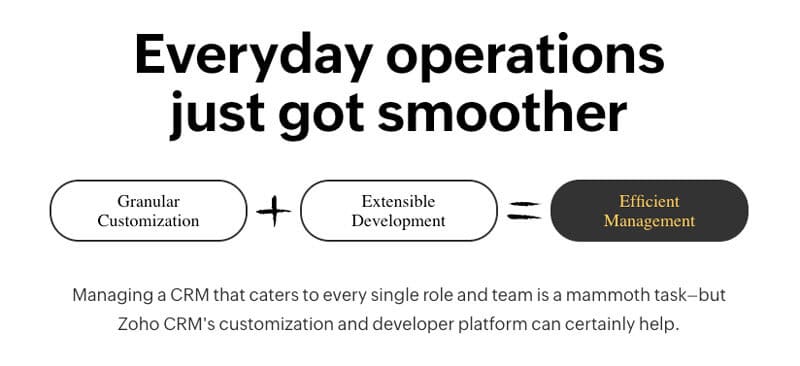
You can even build custom mobile apps to run your business beyond the desktop! Drag and drop design makes customizing fields fast and easy. Get on board with a platform that grows with your business—Zoho’s CRM is easily adaptable and customizable at every stage of your journey.
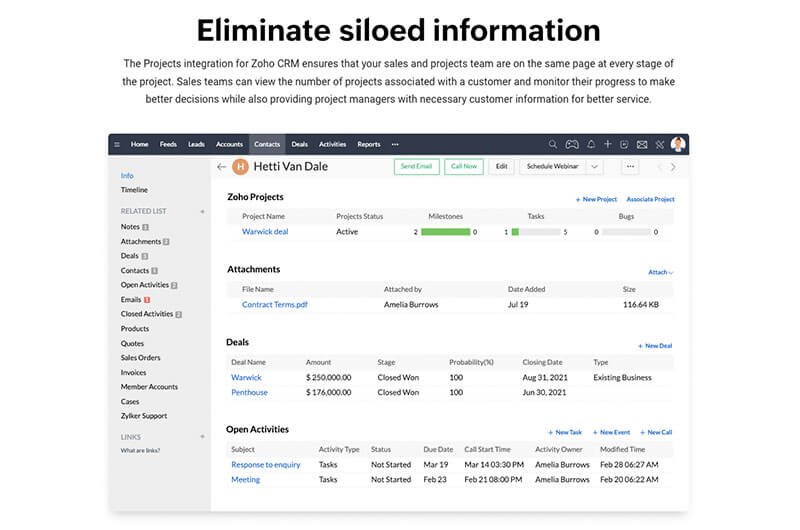
Is your workflow…well, flowing?
A pinch of nutmeg in a #PSL makes a huge difference.
Enter Zoho CRM’s workflows.
Here are just a few of the perks your team can glean from Zoho’s workflow perks:
❌Avoid ❌
✅ Gain ✅
Customization is the name of the game. Zoho CRM allows your team to create your platform on how you work. That means you personalize everything the way you need it and ditch anything that doesn’t serve your team in daily operations. Hear it straight from Zoho’s developers:
Zoho's configurations and customizations help you adapt your CRM to the way your team works. Control how information passes through your pipeline with custom modules, fields, and buttons. Optimize your CRM by picking and choosing the features you need most with native and third-party apps available through the Zoho Marketplace.
Customize what matters most:

Now, this is a winning feature! Zoho allows your team to develop custom scripts to automate the routine CRM tasks that your organization performs most often and help your sales team focus on their most critical tasks. Client scripts are the ginger to our latte—something you didn’t think you needed, but it makes all the difference. This “pinch of ginger” allows your team to cater to client needs from the get-go.
Even better, your team doesn’t risk data security!

Design the CRM of your dreams with Canvas Studio! Zoho goes the extra mile with its fully customizable design options. Ditch a boring database and adopt a clean, easy-to-use platform that engages users and equips you to stay organized. Design experience isn’t necessary! In fact, the drag-and-drop studio makes customization easy!
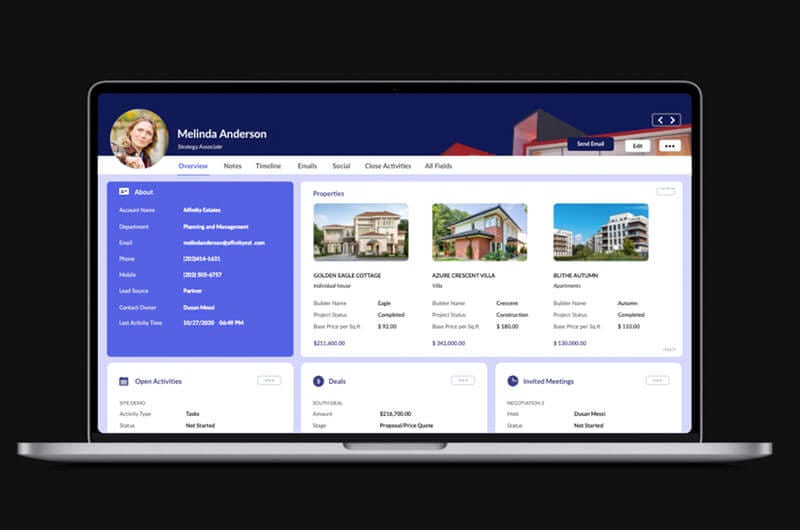
View design examples here.
Thanks “a latte” for reading this post. We’re excited to help you explore the capabilities of how you can easily optimize your CRM with Zoho CRM. Get in touch with our team to schedule a free consultation.
Are you reaching your ideal client on social media? An increase in followers doesn’t always mean they’re engaged with your brand. Small businesses can’t ensure a captive audience when readers have an incredibly short attention span. Short of a “please silence your cell phones” message at the movie theater, your marketing team has to engage your audience through intentional content. (Hey, too bad we can’t pop some popcorn for you as you dig through this blog post.)
So, how do you make the most of your social media marketing efforts? We touched on the basics in 5 Ways to Get Strategic in Your Business Marketing, but today we’re going to touch on the importance of engaging your audience.

“I obviously know my audience.”, you say.
We trust you but hear us out.
We’re talking about the difference between knowing your audience and knowing what makes them tick, what their values are, and how you can build trust with them.
Let’s say you run a property management firm for income property owners.
Knowing you’re marketing to middle-aged people in the suburbs is a great start. Dig deeper and you realize that sure, your services are great for a middle-aged audience in the suburbs, but more specifically—those who have an average income of $150k, are close to retirement and want a done-for-them property management company for when they turn their home into a vacation rental and relocate.
Do you see the difference?
It pays to know your ideal client.
When you zero in on your target audience, you gain the ability to:
Pro tip: You may have a few ideal clients. Create a profile for each ideal client so you’re able to hone in on each specified audience in your marketing campaign.

Solidifying your target audience is half the battle. Now, it’s time to lead with customer service best practices. Engaging with your audience is vital for the success of your business. Even in a high-paced world, we all value quality time. We use the word “strategy” loosely here. The main idea is to create a culture of consistent engagement within your marketing strategy.
Here are some standout examples of excellent engagement across social media.
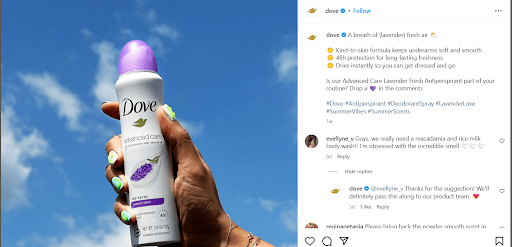
What’s to love?
Dove’s team commented on a suggestion for a new product scent. In less than 30 seconds, they validated their follower’s idea and said they’d pass it along. It’s an amazing example of hearing your out audiences and showing that they matter.

What’s to love?
A follower commented that the post didn’t specify the exact location and Visit San Diego took time to clarify. This simple point of engagement not only helped the commenter but anyone else that may have had the same question. Seems simple, right? Engaging with your audience clears up any misunderstandings.

What’s to love?
Kris replies to a comment saying the salad dressing recipe will be available in a few days. Engaging your audience creates opportunities to build anticipation for a future offer. Taking time to do this doesn’t just build trust with your followers, but gives them a reason to keep checking in.
Engagement with your audience is essential to building rapport with them, but how do you engage? Is it really as simple as replying to comments on social media? The short answer is yes!
We’ve put together some pro tips with our partners over at Lucent Creative.

We hope you’re learning from our social media series. Our partners at Lucent Creative are marketing gurus and we appreciate their help with all things marketing! If you haven’t already, go check out other posts in this series.
An active social media presence is vital for your business’ success.
You likely use at least one social media platform. If you’re not a Facebook fan, you’re probably on LinkedIn networking with other business owners. Maybe you’re obsessed with TikTok and mindlessly scroll on lunch breaks. The truth is, your ideal clients also hang out on social media whether it’s for work or buying some time waiting for their tires to be rotated.
The sheer volume of social media users puts your business at a disadvantage if you’re not showing up where your dream client or customer is.
Let’s check the stats from SproutSocial.
Now, if you’re like us—those astronomical numbers can feel overwhelming. With nearly 5 billion users (yes, BILLION!), where do you even start making a dent in reach?

Here’s an unpopular opinion: start anywhere—somewhere—and do it imperfectly.
The biggest challenge with social media is to nail down consistency and then, check the data to pivot where your ideal client is. We’re going to unpack a few of our tips and tricks with our marketing partners at Lucent Creative to help you get out of an uninspired rut when it comes to social media.
Pace yourself as a business.
The thing your ideal client is most drawn to is consistency. Here are a few tips to get your social media strategy working for you:
Remember, the goal isn’t to conquer all of social media—it’s to find your ideal audience and speak directly to them–turning them into loyal customers, of course!

A business may have 30,000 followers but fail to interact with people commenting with pressing questions. Nurturing warm leads is vital in any sales pipeline. When you think of social media as an opportunity to build rapport with potential customers, you’ll eagerly answer questions.
Not sure how much time to commit to interacting with followers? Here are a few ways our partners at Lucent Creative suggest tackling the task:
A bit of “small talk” on social accounts can do a lot of heavy lifting when it comes to building trust with your audience.

Here’s where most brands feel pressure. Let’s take a moment to think through this before you create a mental block. Unique doesn’t necessarily mean your brand “outshines” other businesses on social media. The trick here is to create a unique experience for followers. It doesn’t matter how you describe your business—professional, whimsical, approachable, or “pun loving”.
Campaigns can look like:
Here are some examples of wildly different businesses creating something uniquely engaging for their audiences.
We all want to be inspired and Nike brought all of the good feels with this campaign. It engages the audience and gives them a clear call to action (tag your friends).

This campaign does a great job of helping the audience see alternative ways to use their product. You don’t have to be an avid hiker or skydiver to use a GoPro!

A smaller business in San Diego hosted an awesome giveaway—a one-of-a-kind accent wall! This is a great example of how a giveaway can engage your audience while getting more eyes on your product or service.

Help potential customers by painting a picture of how your product or service will improve their lives. Storytelling, interviews, and other “social proof” are effective ways to “show and tell” your product.

Whether you’re a realtor, consultant, or aspiring to create Nike 2.0, your business needs a social media presence. Take the overwhelm out of the equation by starting small consistent steps. Get in front of your audience and adjust your social media strategy as the data dictates.
Are you still feeling apprehensive? Our experts can guide you through the process. Get in touch for a free consultation and we’ll happily lend a hand.
PS: While you’re at it, go ahead and follow us on social!
How would you rate your current Client Relationship Management (CRM) platform?
Wait.
What is a CRM?
A Client Management System is the fairy godmother of organizing important client information. Everything from client contact information, where they are in the sales pipeline, invoicing details, and more resides in a CRM. An excellent Client Management system saves your team time, and money, and gives you a healthy return on your investment (ROI for our lingo-loving friends).
Whether you’re just now launching your business or you’ve been in the game for a while, you likely already know the importance of a CRM.
Here are a few fun facts from Zippia about CRMs to emphasize just how vital they are to your success:
Now that we’ve laid a solid foundation (your business needs one!), we will dive into our favorite–Zoho CRM.

The business management guru Zoho turns customers into raving fans and it’s no wonder why. Zoho offers just about any assistance with your business’s daily operations, from Zoho Sales IQ (their live chat app) to Zoho Books (their user-friendly bookkeeping app). Woggle is a Zoho super fan and certified partner because we have seen the impressive growth tools of Zoho in our business and the businesses of our clients.
Zoho CRM is user-friendly and has endless tricks up its sleeve. It’s so streamlined and agile for personalization that it feels like a total business hack.
Here are a few of the perks of Zoho CRM:

The list goes on and on, which you can find here. Does your CRM do all that? If not, you may be wondering how you can switch over (yesterday!). Let’s walk through a few FAQs first.
We’ve seen the migration process firsthand hundreds of times and we stand behind the process 100%. Not only is it easy to migrate to Zoho CRM, but it’s also safe. Zoho CRM takes the guesswork out of data migration—you don’t have to wonder if files aren’t supported, etc. Each step of the process is mapped and you’re given the prompts to follow for a smooth transition.
Yes! We’re happy to tell you that Zoho CRM migrates data from some of the business world’s biggest CRM platforms, including:
More CRMs are eligible and you can find detailed migration instructions for each platform on Zoho’s site. See, we told you they’re amazing!
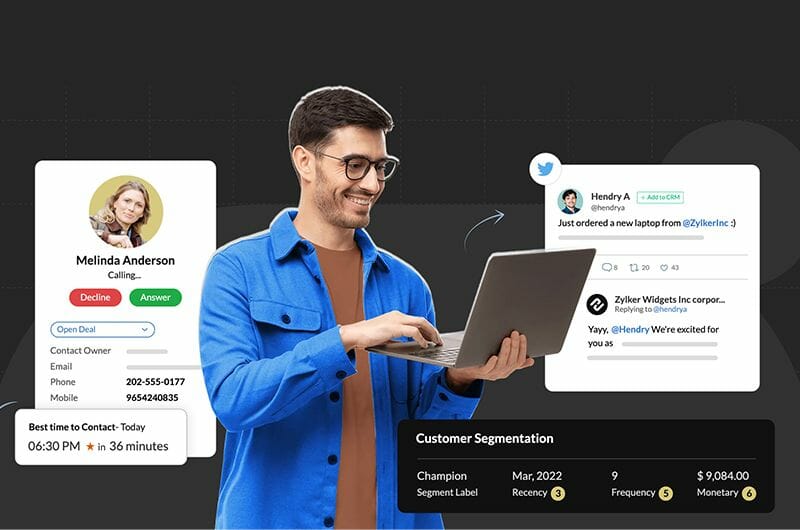
Aren’t sure if you’re ready for the leap? Read more about how your CRM stacks up against Zoho CRM.
Going from your CRM to Zoho CRM is easy and Zoho makes it even easier with their step-by-step guides. Depending on which CRM you’re migrating from, it may take you more time or present unique steps.
The most comprehensive instructions are here.
Zoho CRM provides a custom-made setup to migrate from Salesforce, other Zoho CRM accounts, Pipedrive, Highrise, Insightly, MS Dynamics, Maximizer, or any other CRM.
You can migrate from Pipedrive, Highrise, Hubspot, and Insightly via API. All you need is the instance URL.
We highly recommend checking out Zoho’s notes before you begin the migration process to ensure your team has allocated enough time and resources. Read through Zoho CRM FAQs to get ahead of the ball and troubleshoot before you begin.

If you’re not sure Zoho CRM is for you, take time to explore these Zoho CRM tutorials for a sneak peek behind the scenes.
While Zoho CRM makes migration easy, we realize your team may be short on time, patience, or a combination of the two! Our experts have years of migration experience and as a Zoho Partner, we know Zoho inside and out. We’re happy to help your team migrate over to Zoho CRM so you can focus on your zone of genius. Get in touch for a consultation.
What does your current marketing strategy say about your business? Whether you’re new to the game and the ink just dried on your LLC papers or you’ve been around long enough to reinvent your business several times, marketing is crucial to your success. Let’s clarify—strategic marketing is essential for the success and longevity of your business. Marketing trends come and go, and sometimes they even come back to leave again. If you pay attention to marketing tips for any length of time, you’ll see they ebb and flow like the tide which can leave business owners like us feeling overwhelmed, right?
Thankfully, our business partners and rad friends over at Lucent Creative, an all-female digital marketing agency, help us to stay focused and on-point with our marketing efforts. Today, we’re sharing some nuggets of wisdom their team shared with us. Before we jump in, let’s review a few stats about marketing.
These marketing stats are just scraping the surface of why strategic marketing is essential to the life of your business. Marketing gives you a platform to share your product or service, but strategic marketing gives you a direct line with your ideal customer. See the difference?

Let’s get straight to the tips from our friends at Lucent Creative. Take these five action steps straight to your team today.
Do you feel that your marketing strategy is complex, but not accomplishing much? If you’re following marketing trends rather than your ideal customer, it’s time to reassess. For example, if your ideal customers are retirees looking for wealth management options, your TikTok strategy probably isn’t yielding great results.
Lucent Creative’s CEO and Founder Kendall Walker shared,
“I have been in marketing for years and have seen a lot of ambitious and well-intentioned businesses stall in their growth because they weren’t focused on their marketing efforts. Thankfully, there are always opportunities to stop, reassess, and pivot. My advice to businesses with any marketing budget is to study where their ideal customers are and put their marketing efforts exclusively into those platforms.”

Read all about creating an email campaign that rocks with Zoho Campaigns.
Customers purchase from brands they trust. Earning the trust of your ideal client or customer requires engagement. Ironically, this is a step that is either neglected entirely or not focused on enough in marketing strategies. We got some insight into engagement with Lucent Creative’s social media strategist.
“I encourage clients to engage with their followers daily. If someone comments on your post, it’s crucial to reply. It’s a marketing 'hack' that humanizes your brand and helps build trust. Engagement doesn’t take a lot of time. If you spend ten minutes a day engaging with your followers in the comments and stories, I bet you’ll see an influx in sales soon. You’ve given them a reason to go all-in with just a few minutes of approachability.”
You may know what to say about your product, but do you know how to reach your ideal audience? This is where brand voice (what you say) and brand tone (how you say it) come into play. A business selling life insurance plans wouldn’t have the same brand voice or tone as a hot sauce company. Technically, anything could happen, but we’d venture to say it just wouldn’t be strategic or best practice.
Lucent Creative’s copywriter gave us a few tips in this area.
“Establishing your brand voice and tone is the foundation of your marketing strategy. It all starts with being incredibly intentional about who you’re talking to and how they can benefit from your product. Explore your ideal customer’s needs, struggles, purchasing habits, and anticipated hesitations about buying your product. If you do this, you’re going to set your entire marketing team up for success.”

Marketing isn’t a “set it and forget it” aspect of business. It’s as important as your product development, sales, and employee retention. What is working today may need adjusting next quarter.
Kendall Walker shared another piece of wisdom with us about the need for pivoting often.
“Marketing strategies need to grow and change with your business. Algorithms change, of course, but so do your customers and their expectations. What works now may not work next year. Keep an eye on the data, customer feedback, and ultimately, the trajectory of your business. Think of your marketing strategy needing frequent “checkups”. Schedule these and get your team thinking creatively about how to make your great strategy even better.”

How’s your website working for you? Read Your Guide to Designing an Epic Website
Be mindful to recognize and thank your loyal customers. Your business can do this in a lot of ways, but starting with a simple loyalty program or exclusive offers is a great place to invest your time and money. 75% of consumers will favor a brand if there is a loyalty program. 71% of consumers who are members of loyalty programs say membership is a meaningful part of their relationships with brands.
To wrap up, we asked Kendall, her social strategist, and copywriter to share their insight on how businesses can best show appreciation for loyal customers. Here’s what they had to say.
“I can’t stress the importance of creating the image of being a thorough and approachable brand. People want to know they can ask questions, express concerns, and rely on you, the expert, to give them valuable insight.”
Kendall, Lucent Creative CEO and Founder
“I agree with Kendall. The way to create a multiple-level point of contact people actually want to take advantage of is through intentional copywriting. Show your brand personality and always put the customer first in all of your written content. People catch on immediately if they’re appreciated and if they can keep trusting your business/product.”
Lucent’s copywriter
“To go along with this theme, I think it’s important to remind businesses that their social media is their “storefront” and their “first date”. This is the first impression of your brand. This goes beyond social media, of course. Your website matters. Email marketing campaigns are also a first-row view into your brand. Be consistent and your customers will continue to trust you and purchase from you.”
Lucent’s social media strategist
We all know marketing is important, but these five tips are ways to go the extra mile for your customers. The main idea is to not become complacent in your marketing efforts. Keep an eye on the data and your customers’ needs.
If you’re looking to partner with Woggle and Lucent Creative for your marketing efforts, get in touch to book your free consultation call.
You’ve probably heard about the new AI guru taking the world by storm. ChatGPT has business owners wondering if they can minimize their marketing teams and copywriters if they keep their jobs.
OpenAI, the developers of ChatGPT, says this about their “Frankenstein’s Monster,” “We’ve trained a model called ChatGPT which interacts in a conversational way. The dialogue format makes it possible for ChatGPT to answer followup questions, admit its mistakes, challenge incorrect premises, and reject inappropriate requests.”
We’re impressed by the overall capability of ChatGPT (and a little unsettled?). It’s undoubtedly a fantastic tool to have on hand, but we started wondering if it could replace professional copywriters.

As a team who specializes in consultancy and marketing, we wanted to give ChatGPT a spin. Here’s what happened.
We got straight to the point. After all, ChatGPT is AI, and we didn’t take the time to discuss the weather or future summer vacation plans.
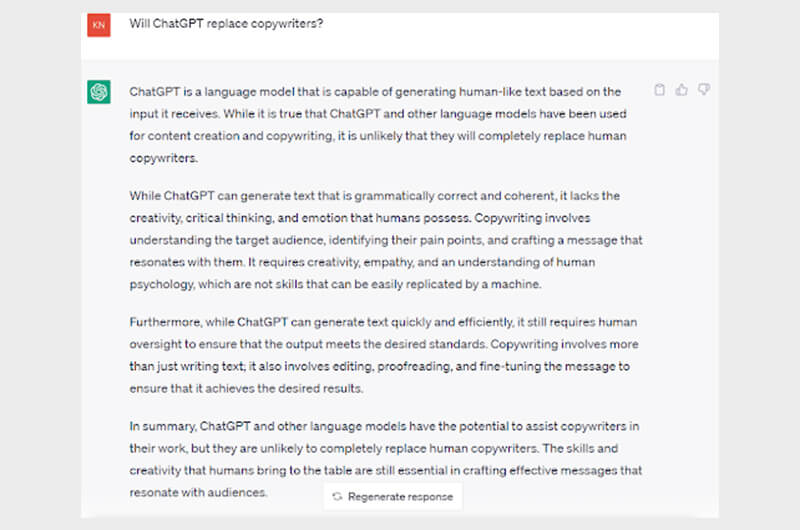
In a nutshell, the AI platform admitted that although it’s excellent, it doesn’t have the human capacity to complete a copywriting project from start to finish. We figured as much, but look at the details—copywriting is a multifaceted skill set. ChatGPT cannot:
Where does this leave marketing teams? We still weren’t sure. ChatGPT was an admitted non-writer, and we wanted to test the waters. Could AI present the same information in various tones of voice?
We chose a topic and asked our AI friend to give us general information on email campaigns. It didn’t disappoint.
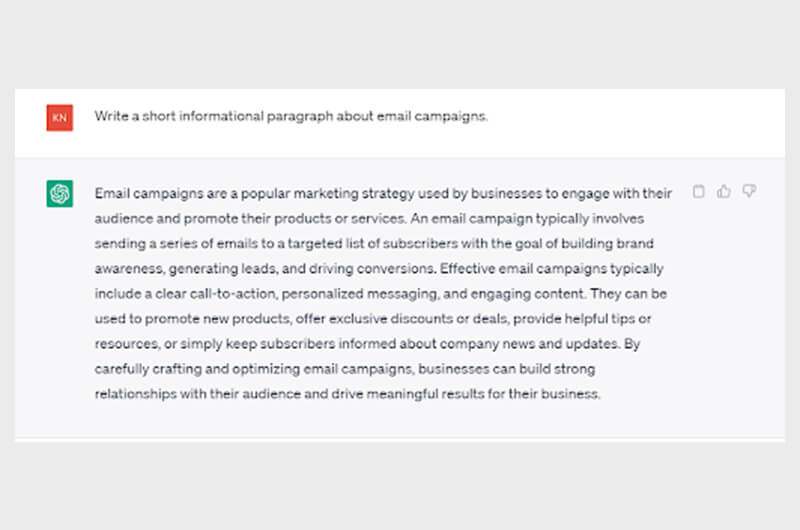
Here’s how ChatGPT delivered when given the task:
Although it checked the boxes, the copy is missing tone or any indication it’s being written for a specific audience. So, we took things a step further. We asked ChatGPT to give us copy that was more informal and approachable.
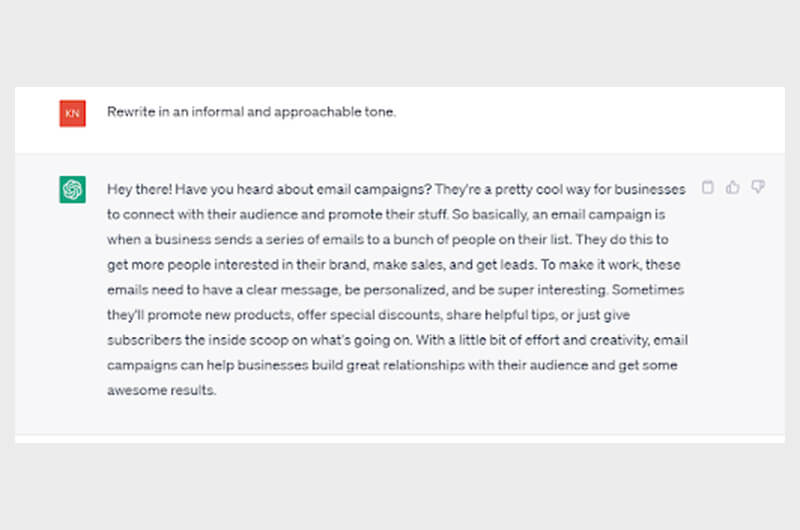
Now, we were getting somewhere. ChatGPT took our commands and created something sounding more human. Was this the proof we needed to ditch our copywriters? Not exactly.
Although ChatGPT considered our notes and had an unbeatable turnaround time, it didn’t create copy for a specific audience. For example, this may be too informal for some. ChatGPT delivered a conversational tone, but fine-tuning would be needed for most of our marketing clients.
We wanted to see how AI would present the same information with different instructions regarding tone. Unfortunately, we had a little too much fun here.
First, we asked ChatGPT to rewrite the information using extreme formality. It immediately went to the task and created copy that was fit for a medieval knight or inner circle of a 1600s royal court.
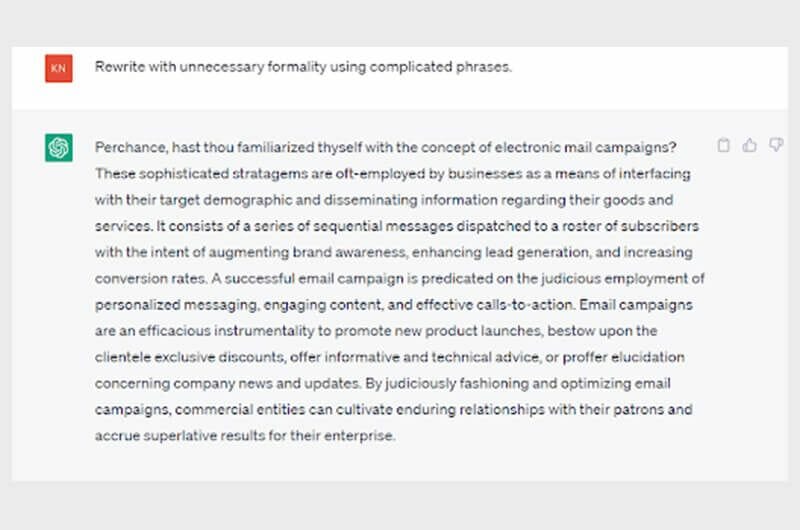
Then, we experimented on the other side of the spectrum. We asked the AI platform to explain email campaigns with sarcasm. After a good laugh, we called an end to our experimentation so our human writer could get to work on this blog post.
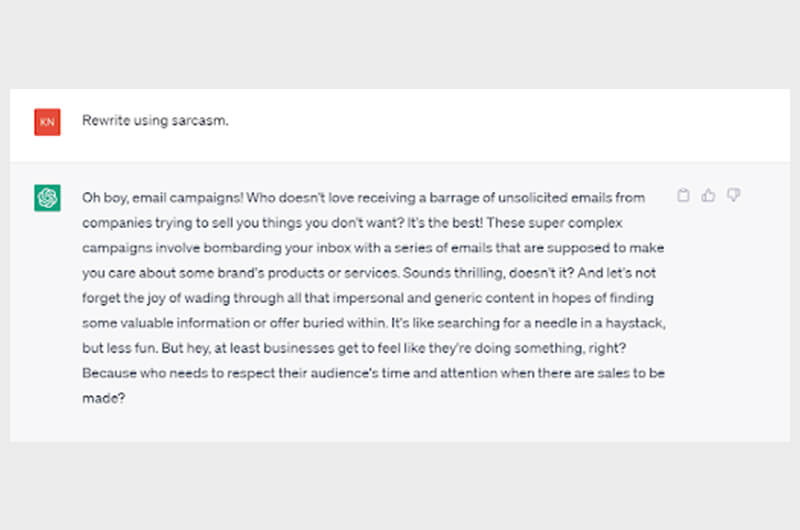
Our team agrees the AI platform is impressive. It’s a significant step in the right direction. The capabilities of ChatGPT will help businesses make strides in marketing.
We appreciate:
When it comes to using ChatGPT in marketing efforts, we’re still wary. In our opinion, the inability to cater copy directly to your ideal client doesn’t make the platform sustainable for all your written content needs. However, we see the value of using ChatGPT sparingly in short-form content such as social media posts or as an assistant in writing speeches or presentations.
The biggest cautionary tip is to use ChatGPT sparingly in your marketing. It’s not near a point of replacing human writers. The copy will still need editing to bring in the human tone to attract clients.
Here are a few tips for implementing ChatGPT into your marketing efforts:

ChatGPT is a considerable breakthrough in AI, and we love it. We had fun experimenting with the various tones and giving the platform instructions to prove the world still needs writers. However, even the best style implementation with ChatGPT doesn’t consider your client’s pain points. Contact our team if you’re looking for a group of humans to help with your copywriting and content writing. Our friends at Lucent Creative partner with us to give business owners like you personable written content that speaks directly to your ideal and converts them into loyal customers.